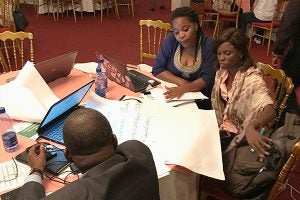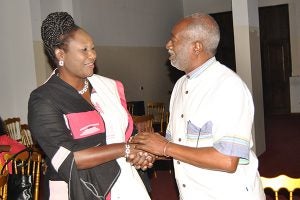Addressing norms together: Reflections from the Francophone Africa community of practice launch in Kinshasa, DRC
“Nous sommes une grande famille, maintenant” / “Together, we’re one big family, now” – Many of our regional members!
On June 28 and 29 in Kinshasa, Democratic Republic of Congo (DRC), over 30 regional members joined together for the kick-off convening meeting of the Francophone Africa regional community of practice on the scale-up of normative change for adolescent and youth sexual and reproductive health (AYSRH). Nine countries were represented—DRC, Mali, Togo, Côte d’Ivoire, Niger, Sénégal, Chad, Benin and Cameroon—with participants from government ministries, USAID Missions, international, local, and community-based local non-governmental organizations, and academic institutions.
What we learned
 The kick-off meeting provided an opportunity for participants to come together to collaborate and learn from each other’s experiences related to social norm change and scale up of normative interventions. Sessions were dedicated to determining shared vision, setting priorities, exploring thematic focus, situating our collective work in the regional context, and visiting intervention sites under the Passages project in the DRC.
The kick-off meeting provided an opportunity for participants to come together to collaborate and learn from each other’s experiences related to social norm change and scale up of normative interventions. Sessions were dedicated to determining shared vision, setting priorities, exploring thematic focus, situating our collective work in the regional context, and visiting intervention sites under the Passages project in the DRC.
With a goal to reflect upon and prioritize regional Francophone Africa needs, the regional community of practice learned there was:
- A strong sense of collective identity (nous sommes une famille) and a shared pride and experience to build from in the region.
- Agreement on areas of work and interest, and a need to map ongoing projects in the region in an actionable way. Many suggested a best practices for social norms programming and their scale-up guide for Francophone Africa.
- A need to have practical, adaptable, easy-to-use lexicons, tools and general information on these themes, as opposed to complex, inaccessible resources.
Our priorities
 During the meeting, members engaged actively in mapping out topics of key interest and agreed to manage structured discussion online via Springboard for maximum collaboration. Throughout the year, members will take forward their workplans, and share knowledge and progress along the way. Some of the key priorities identified by the regional community of practice include:
During the meeting, members engaged actively in mapping out topics of key interest and agreed to manage structured discussion online via Springboard for maximum collaboration. Throughout the year, members will take forward their workplans, and share knowledge and progress along the way. Some of the key priorities identified by the regional community of practice include:
- Documenting and showcasing best practices for scaling up normative change for AYSRH in the region
- Reinforcing our understanding of the intricacies of the scale-up process and planning with the end in mind
- Understanding how influential community members, like faith leaders, reinforce harmful norms or can be change agents for positive social norm change
- Sharing tools and resources and determining best practices for monitoring and evaluation of normative interventions
Today, members continue to register and engage in the Springboard platform, and are eager to hear from others. The coming year brings many opportunities to grow together at both regional and national levels.
About the Communities of Practice
With support from USAID’s Gender Equality and Women’s Empowerment Office, Passages formed two regional communities of practice—one in Francophone Africa and one in South Asia—on the scale-up of normative change for adolescent and youth sexual and reproductive health. The purpose of the communities of practice is to focus regionally on advancing knowledge sharing, collaboration, practice, and advocacy around social norms transformation among individuals, researchers, organizations, projects, and donors aiming to improve adolescent and youth sexual and reproductive health outcomes at scale. The communities will provide a platform for building knowledge and capacity, fostering supportive professional networks across sectors, and sharing emerging evidence and promising practices. The communities will also advocate for investment in the expansion of adolescent and youth normative interventions. Learn more about Passages’ Regional Communities of Practice
—
Passages, led by the Institute for Reproductive Health at Georgetown University in partnership with FHI 360, JHU’s Global Early Adolescent Study, PSI, Save the Children and Tearfund, aims to address a broad range of social norms, at scale, to achieve sustained improvements in family planning and sexual and reproductive health. This research project is building the evidence base and contributing to the capacity of the global community to strengthen normative environments that support positive family planning and sexual and reproductive health, especially among very young adolescents, newly married couples, and first-time parents. Check out more here.
 Where We Work
Where We Work  Press Room
Press Room  FACT Project
FACT Project  Passages Project
Passages Project  Learning Collaborative
Learning Collaborative  Search All Resources
Search All Resources  Social Norms
Social Norms  Fertility Awareness Methods
Fertility Awareness Methods